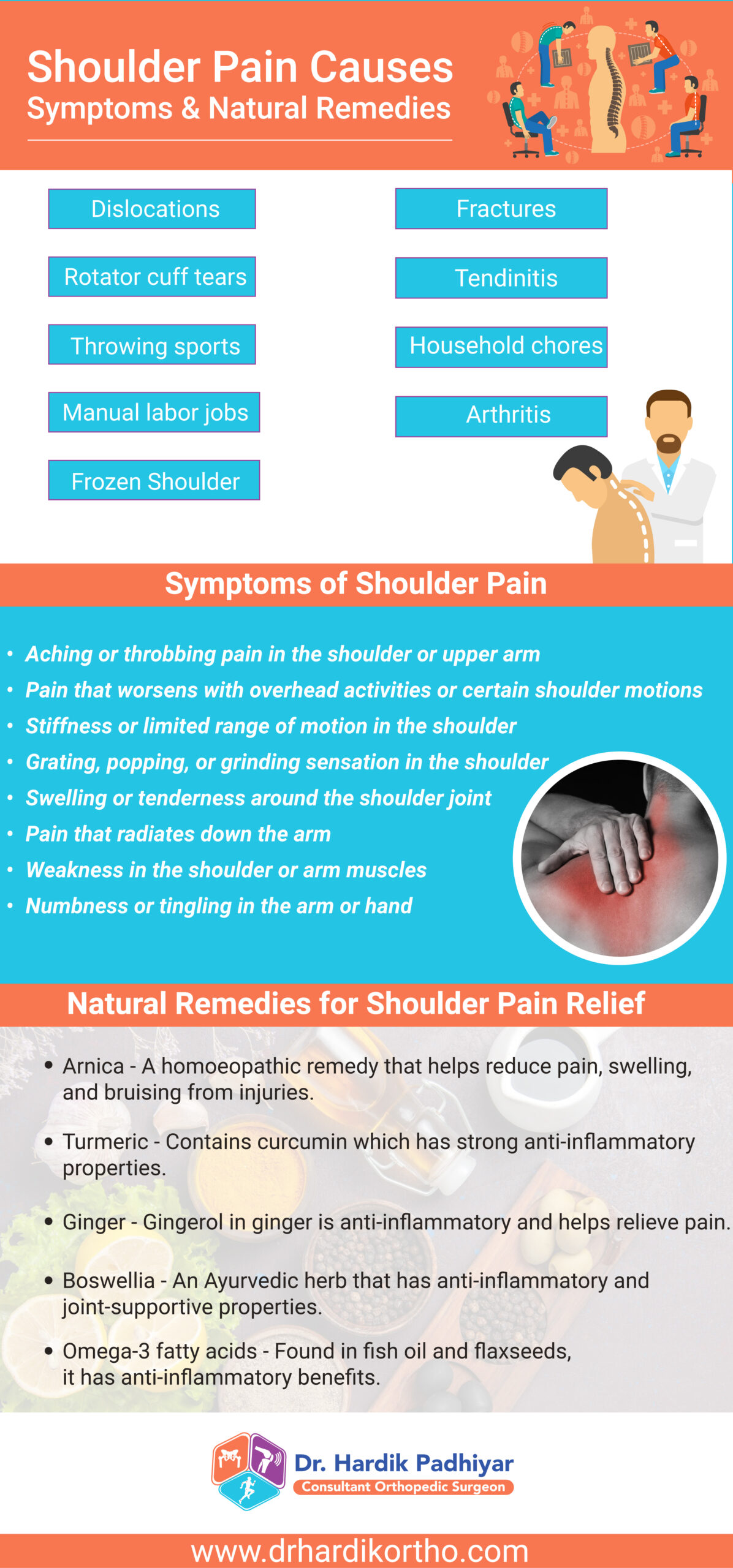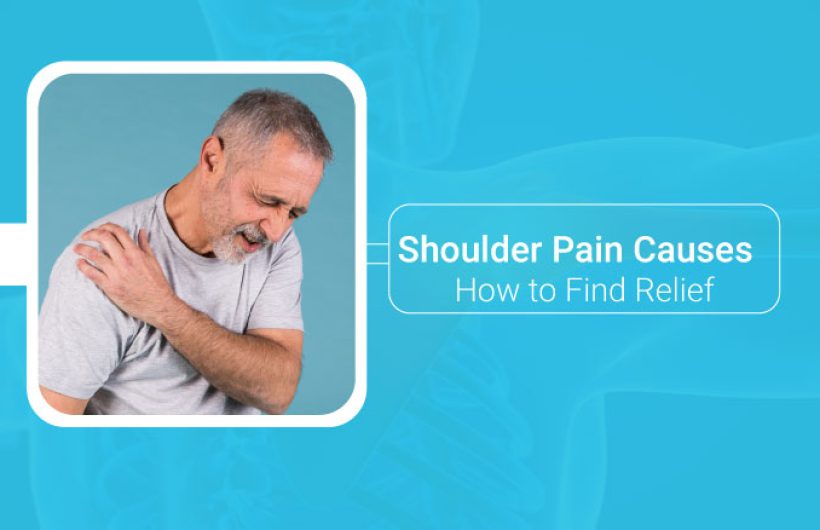Your shoulders are complex joints that allow you to move your arms in many directions. However, this flexibility and range of motion also makes your shoulders prone to injuries and pain. Shoulder pain is a common musculoskeletal problem that can be caused by injuries, overuse, and various medical conditions. In this article, we will discuss the most common causes of shoulder pain and various treatment options that can help provide relief.
Shoulder Pain Reasons
Shoulder pain has many potential causes. Injuries from falls, accidents or overuse are common triggers. Repeated and forceful overhead activities can strain the rotator cuff muscles and tendons, leading to tendonitis. The acromioclavicular joint can be injured from falls or blows to the shoulder. Impingement occurs when tissues are pinched between bones, causing inflammation and pain. Arthritis as a result of normal wear and tear damages cartilage cushions. Bursitis causes inflammation of fluid-filled sacs in the shoulder. Referred pain from neck issues can manifest as shoulder discomfort. Other causes include frozen shoulder, bone spurs, and fractures. Proper diagnosis is needed to identify the underlying Shoulder pain reasons and guide treatment.

Shoulder Pain Causes
There are several Shoulder Pain Causes why you may be experiencing pain. Identifying the underlying cause is important for determining the best treatment approach. Some of the most common causes of shoulder pain include:
Injuries
Shoulder injuries are one of the leading causes of shoulder pain. Some common shoulder injuries that can cause pain include:
- Dislocations: When the ball of the upper arm bone is forced out of the shoulder socket, it is called a shoulder dislocation. This type of traumatic injury causes intense pain.
- Fractures: Fractures or breaks in the bones around the shoulder joint like the collarbone or upper arm bone can occur due to high-impact injuries and cause shoulder pain.
- Rotator cuff tears: The rotator cuff is a group of muscles and tendons that stabilize the shoulder joint. Overuse, age, or trauma can cause tears in these tissues and lead to shoulder pain and weakness.
- Tendinitis: Inflammation of the tendons around the shoulder joint, usually due to overuse or repetitive shoulder motions, is a common cause of shoulder pain.
Overuse injuries
Constantly performing the same shoulder motions without adequate rest or warming up can strain the muscles, tendons, and ligaments over time. This can lead to overuse injuries like tendinitis, bursitis, and rotator cuff damage. Common Shoulder Pain Causes include:
- Throwing sports: Baseball, tennis, volleyball etc. place a lot of stress on the shoulder joint.
- Manual labor jobs: Jobs involving overhead work, lifting, pulling, or repetitive arm motions increase the risk.
- Household chores: Painting, gardening, or other chores done overhead can strain the shoulders.
Arthritis
Both osteoarthritis and rheumatoid arthritis can cause inflammation and damage to the shoulder joint over time and lead to chronic shoulder pain. Osteoarthritis develops due to normal wear and tear on the cartilage between bones. Rheumatoid arthritis is a condition where the immune system attacks the joint lining.
Impingement
Shoulder impingement occurs when the rotator cuff tendons get compressed or pinched between the upper arm bone and the shoulder blade. It often develops due to postural issues or repetitive shoulder motions. Impingement can cause pain in the shoulder and arm.
Other causes
Other less common shoulder pain causes include frozen shoulder, adhesive capsulitis, referred pain from neck issues, tumours, infections, and fractures. Understanding the underlying cause is important for the treatment approach.
Symptoms of Shoulder Pain
Some common symptoms experienced with shoulder pain include:
- Aching or throbbing pain in the shoulder or upper arm
- Pain that worsens with overhead activities or certain shoulder motions
- Stiffness or limited range of motion in the shoulder
- Grating, popping, or grinding sensation in the shoulder
- Swelling or tenderness around the shoulder joint
- Pain that radiates down the arm
- Weakness in the shoulder or arm muscles
- Numbness or tingling in the arm or hand
The severity and exact location of pain may vary depending on the underlying cause. Pain at night or that disturbs sleep is also not uncommon. Along with pain, look out for symptoms like deformity, bruising, or numbness after an injury.
Shoulder Pain Treatment
The Shoulder Pain Treatment approach will depend on its underlying cause. Conservative or non-surgical treatments are usually tried first before considering surgery:
- Rest and Avoiding Aggravating Activities: Resting the painful shoulder and avoiding activities that cause pain like overhead motions can help reduce inflammation and stress on the joint.
- Ice and Heat Therapy : Applying ice packs wrapped in a towel to the painful shoulder for 15-20 minutes, 2-4 times a day can help reduce pain and swelling. Heat therapy with a heating pad may also provide shoulder Pain relief by relaxing tight muscles.
- Physical Therapy: Physiotherapy focuses on stretching, strengthening, and stabilising shoulder muscles through specific exercises. Gentle massage and ultrasound therapy may also help. Doing the prescribed exercises regularly is important for recovery.
- NSAIDs and Pain Relievers: Over-the-counter anti-inflammatory medications like ibuprofen can help reduce pain and inflammation. Prescription strength NSAIDs may be advised in some cases. Pain relievers for shoulder Pain relief can also help manage shoulder pain.
- Corticosteroid Injections: For conditions like bursitis, tendinitis or impingement, corticosteroid injections directly into the painful area under ultrasound guidance may significantly reduce inflammation and pain.
- Orthopedic Devices and Bracing: Shoulder braces, slings or straps can help support the joint and restrict painful shoulder motions during recovery. They are commonly used after injuries.
- Surgery: If pain persists despite conservative treatments or for conditions like rotator cuff tears, labral tears, shoulder instability etc Surgery may be required for repair or shoulder Pain relief, reconstruction of damaged tissues.
- Lifestyle Changes: Maintaining a healthy weight, improving posture, and modifying activities that strain the shoulders can help prevent future pain episodes. Stress management techniques may also provide relief.
Natural Remedies for Shoulder Pain Relief
Along with medical treatments, some natural remedies may also help provide relief from shoulder pain:
- Arnica – A homoeopathic remedy that helps reduce pain, swelling, and bruising from injuries.
- Turmeric – Contains curcumin which has strong anti-inflammatory properties.
- Ginger – Gingerol in ginger is anti-inflammatory and helps relieve pain.
- Boswellia – An Ayurvedic herb that has anti-inflammatory and joint-supportive properties.
- Omega-3 fatty acids – Found in fish oil and flaxseeds, it has anti-inflammatory benefits.
- Acupuncture – May help relieve pain by stimulating pressure points near the shoulder.
When to See a Doctor for Shoulder Pain
- While mild shoulder pain can often be managed at home, it’s important to see a doctor if:
- Pain persists for more than 2-3 weeks despite home treatments.
- Pain is severe, constant, or worsens over time.
- There is a history of significant trauma to the shoulder.
- You suspect a fracture based on the mechanism of injury.
- Movement is significantly limited or the shoulder appears deformed.
- Symptoms are accompanied by fever, swelling, bruising, or numbness.
- The pain radiates down the arm and is accompanied by numbness.
- Underlying conditions like arthritis or diabetes are present.
- Over-the-counter medications provide no relief.
Conclusion
Seeking prompt medical attention helps accurately diagnose and treat any underlying cause of shoulder pain before it worsens or leads to long-term. In conclusion, improper treatment of orthopedic problems can have a major negative influence on lifestyle and health. Dr. Hardik Padhiyar, Ahmedabad’s leading orthopedic surgeon, has extensive training in diagnosing and treating a variety of musculoskeletal disorders. Any joint, bone, or muscle problems should be discussed with an expert like him for the finest orthopedic therapy.






